Premium Only Content

A Video Explaining Ethics and the Public Insurance Adjuster
The Public Adjusting Profession
When insured’s are busy professionals they simply do not have the time or patience to deal with the details of a first party property claim. The public insurance adjuster exists to assist insureds in the presentation of a claim to the insurer. The public insurance adjuster is, in most states, licensed by the state insurance department. The insurer’s adjuster is often asked to deal with a public insurance adjuster. The contact between the public insurance adjuster and the insurer’s adjuster is often adversarial since the public insurance adjuster wishes to justify his or her contingency fee to the insured. Both should be working toward the same goal: the payment of proper and complete indemnity to the insured.
Public Adjusters claim they are, mostly with good cause, professionals who are employed exclusively by a policyholder who has sustained an insured first party property loss. The public adjuster handles every detail of the claim, working closely with the insured to provide the most equitable and prompt settlement possible. A public adjuster should inspect the loss site immediately, analyze the damages, assemble claim support data, review the insured’s coverage, determine current replacement costs and exclusively serve the client, not the insurance company while working ethically with the insurer’s adjuster.
The National Association of Public Insurance Adjusters (NAPIA) publishes a code of conduct which sets forth the ethical standards that all public insurance adjusters should follow. It provides:
The following Rules of Professional Conduct and Ethics are applicable to all members of the NAPIA:
The members shall conduct themselves in a spirit of fairness and justice to their clients, the Insurance Companies, and the public.
Members shall refrain from improper solicitation.
No misrepresentation of any kind shall be made to an assured or to the Insurance Companies.
Commission rates shall be fair and equitable, and strictly in accordance with the prevailing custom in the locality, and must, where laws or regulations of insurance departments exist, comply fully with such laws or regulations.
Members shall conduct themselves so as to command respect and confidence. They shall work in harmony with one another, with their clients, and the Insurance Companies’ representatives, so as to foster a cordial and harmonious relationship with all branches of the insurance business, and with the general public.
Members must be fitted, by knowledge and experience, for the work they undertake. They must not endanger the interests of the public adjusting profession, or risk injustice to assureds or to the Insurance Companies, by attempting to handle losses or claims for which they are not qualified, and for which they cannot find competent technical assistance.
Members shall not engage in the unauthorized practice of law.
Members shall not acquire any interest in salvaged property or participate in any way, directly or indirectly, in the reconstruction, repair or restoration of damaged property, except with the knowledge, consent and permission of the assured.
Members shall be cooperative and assist one another in every possible way.
Members shall not disseminate or use any form of agreement, advertising, or any printed matter that is harmful to the profession of public adjusting, or which does not comply with the rules and regulations of the Insurance Department of the state in which such member is professionally engaged, or which might subject public adjusting and public adjusters to criticism or disrespect.
An example of a public insurance adjuster and the lawyer who failed to follow the requirements set out by NAPIA. Both represented the same client, involved a claim that resulted from the 1994 Northridge, California earthquake. The earthquake caused billions of dollars in damages across Southern California. It drew lawyers and public adjusters seeking large fees like vultures flying over a dead antelope. As a result of the disaster, investigation by insurers was limited because of the extent of losses caused by the earthquake and the need to rapidly serve their needs. Many unnecessary and spurious suits were filed. Insurance fraud was rampant and insurers paid rather than fight because there was inadequate staff available to deal with fraud and governmental agencies threatened insurers with major fines if they did not pay quickly.
© 2020 – Barry Zalma
Barry Zalma, Esq., CFE, now limits his practice to service as an insurance consultant specializing in insurance coverage, insurance claims handling, insurance bad faith and insurance fraud almost equally for insurers and policyholders. He also serves as an arbitrator or mediator for insurance related disputes. He practiced law in California for more than 44 years as an insurance coverage and claims handling lawyer and more than 52 years in the insurance business. He is available at http://www.zalma.com and zalma@zalma.com.
-
 8:57
8:57
Barry Zalma, Inc. on Insurance Law
1 year agoNo Coverage for Benefits no Right to Bad Faith Damages
193 -
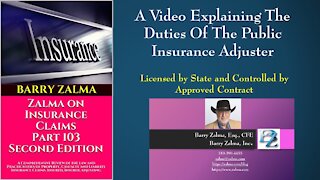 20:42
20:42
Barry Zalma, Inc. on Insurance Law
4 years agoA Video Explaining the Duties of the Public Insurance Adjuster
60 -
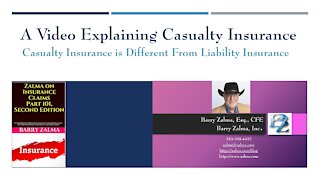 16:42
16:42
Barry Zalma, Inc. on Insurance Law
4 years agoA Video Explaining Casualty Insurance
76 -
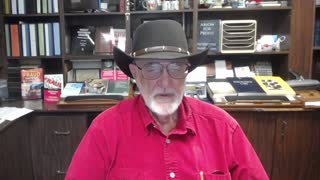 17:29
17:29
Barry Zalma, Inc. on Insurance Law
4 years agoA Video Explaining the Nature of Insurance Underwriting
36 -
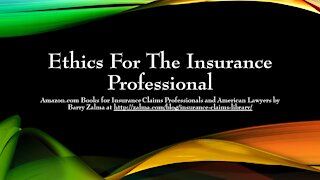 16:52
16:52
Barry Zalma, Inc. on Insurance Law
4 years agoA Video Explaining how to Apply Ethics to the Work of the Insurance Professional
18 -
 14:25
14:25
Barry Zalma, Inc. on Insurance Law
4 years agoA Video Explaining the Importance of Warranties in Insurance Contracts
45 -
 11:53
11:53
Barry Zalma, Inc. on Insurance Law
4 years agoA Video Explaining The Tort of Negligence and Construction Defect Insurance
91 -
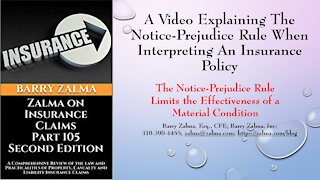 17:01
17:01
Barry Zalma, Inc. on Insurance Law
4 years agoA Video Explaining the Notice-Prejudice Rule When Interpreting an Insurance Policy
45 -
 15:00
15:00
Barry Zalma, Inc. on Insurance Law
4 years agoA Video Explaining The Need For Training Professional Insurance Claims Personnel
63 -
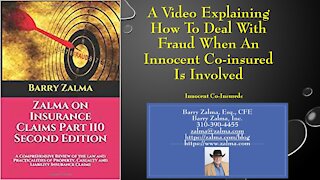 15:10
15:10
Barry Zalma, Inc. on Insurance Law
4 years agoA Video Explaining how to Deal with Insurance Fraud and Innocent Co-Insureds
75